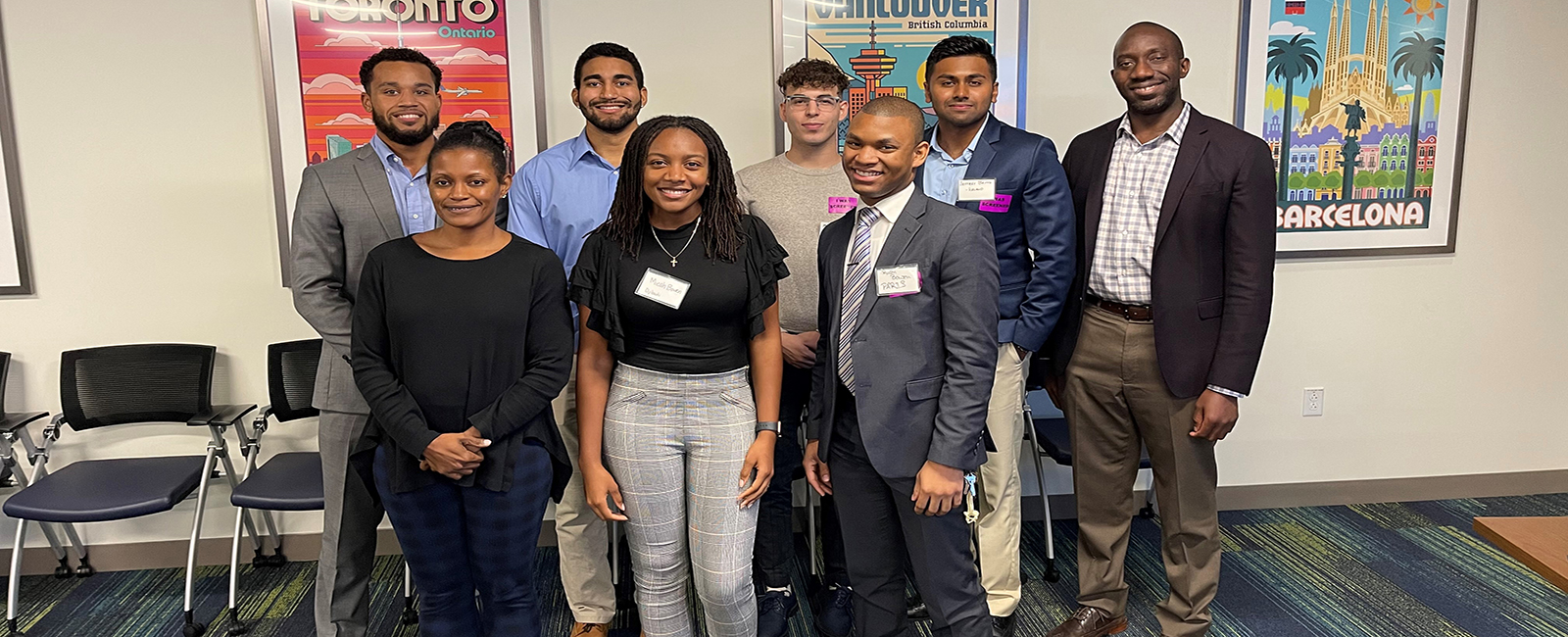Mentorship Program Guides Diverse Students Toward Medical Professions
Micah Bowen discovered her superpower when she was 12 years old.
The University of Florida freshman said it was the day she earned her CPR license while in Girl Scouts.
“I knew that day that if there was an emergency, I could actively help,” said Bowen, now 20 with plans to become a pediatric surgeon. “That’s when I knew I was interested in doing something in the medical community.”
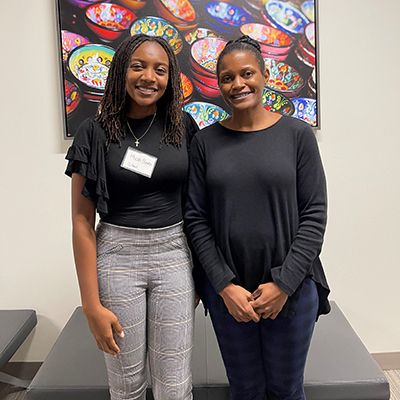
University of Florida freshman Micah Bowen, left, hopes to become a pediatric surgeon through hard work and encouragement from her mentor, Dr. Evita Henderson-Jackson.
Today, Bowen is part of a program that connects medical professionals with medical students in a mentor/mentee relationship. The Faculty Diversity in Oncology Program at Moffitt Cancer Center partnered with the Brain Expansions Scholastic Training (B.E.S.T.) program for the first time in 2021. Formed more than three years ago, the FDOP and its members help to recruit, retain, mentor and sponsor Black and African American faculty members, trainees and students. B.E.S.T. is a pathway program that develops and equips underrepresented and disadvantaged youth to address the national shortage of healthcare professionals.
According to Dr. Odion Binitie, a surgeon with Moffitt’s Sarcoma Program and leader of the faculty group, it’s a way for medical professionals from underrepresented communities to promote careers in medicine to the next generation of their peers.
“This mentor/mentee program runs eight weeks and allows students to shadow physicians and scientists in the clinic and in the lab,” Binitie said. “This allows us to build relationships and provide a way for these students to discuss their journey with people who are like them and who have experienced what it’s like to enter the medical field. It’s invaluable.”
This marks the second year that Moffitt and B.E.S.T. have provided the program. According to B.E.S.T. founder Dr. Dexter Frederick, the two groups have formed a “perfect marriage” for the next generation of health care professionals.
“We exist because there is a void in exposing students to what it takes to become a health professional, especially in underrepresented communities,” Frederick said. “What we try to do is break it up in steps to help students identify what they want to do and understand what it takes to be successful in this career path. Moffitt already had this Faculty Diversity in Oncology Program group, and we had the students. It just made sense for us to work together to provide the guidance and empowerment for the upcoming generation of doctors and nurses.”
While the program officially lasts eight weeks in the summer, Binitie said the relationships between mentors and mentees will continue well into the future.
That’s what Dr. Evita Henderson-Jackson, a Moffitt pathologist and mentor to Bowen, expects as well. This is her second time serving as a mentor in the program and said the connection she makes with students pursuing medicine gives her a chance to share her own experience while learning new perspectives from her mentees.
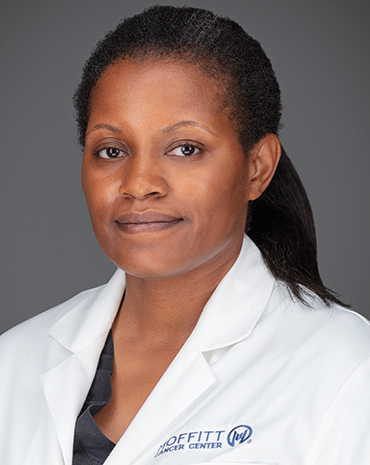
“I am happy to share my experiences with the next generation because these are the people who are going to be taking care of me when I’m older or in need,” Henderson-Jackson said. “I want them to be prepared for what is ahead and to have someone to talk to who looks like them and who is from their same community.”
Bowen says Henderson-Jackson has helped her see health care in a new light and encouraged her to continue her studies to become a pediatric surgeon.
“I’ve always liked being around kids and being the voice that makes them feel comfortable, safe and calm,” she said. “That’s why pediatric surgery calls to me. I can offer comfort during a very difficult time for a young person, and that means a lot to me.”
While Moffitt’s mission is to prevent and cure cancer, the mentees involved in the program aren’t necessarily looking to pursue a career in oncology. That’s the case with Bowen and with Gabe Jones, 20, who plans to become an orthopedic surgeon.
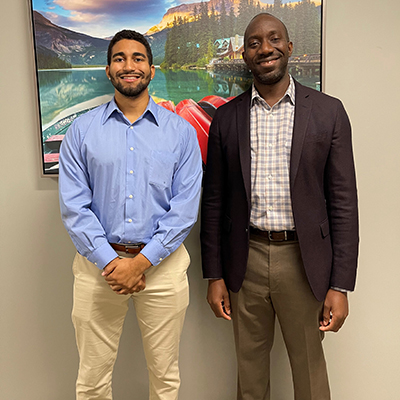
Gabe Jones, left, wants to pursue a career in orthopedic surgery and has shadowed his mentor, Dr. Odion Binitie, this summer.
“I was paired with Dr. Binitie, who has been a wonderful mentor and has really showed me what it means to help people,” Jones said. “He’s shown me it’s about getting to know patients as people and it’s not about blood, guts and needles. I’ve learned so much just by observing him.”
While Jones said he still wants to focus on orthopedics, he said he now has an interest in oncology and may explore that area in his education moving forward.
The 2022 program brought nine mentors together with nine mentees, all with varied backgrounds and different health care career goals. Dr. Iman Washington, a mentor in the program and a radiation oncologist in the Breast section of Moffitt’s Radiation Oncology Program, spoke to the group during a recent gathering at Moffitt. She shared what she considered her best piece of advice.
“Ask for help,” she told the group. “People who work together and ask for help are the ones who can make their journey a little easier. Study in groups, check in with your mentors and peers, that’s so important. And always go to your professor’s office hours if you want to succeed.”
The advice is invaluable to people like Bowen, who said it can be frustrating trying to find a sense of community in school.
“In high school and in college I’ve always been a minority,” she said. “And while I have found my community, it’s been difficult. Knowing that I am in a program where I see doctors who look like me and represent me achieving great things and knowing that they went through the same struggles that I’m going through now, that really offers me comfort.”
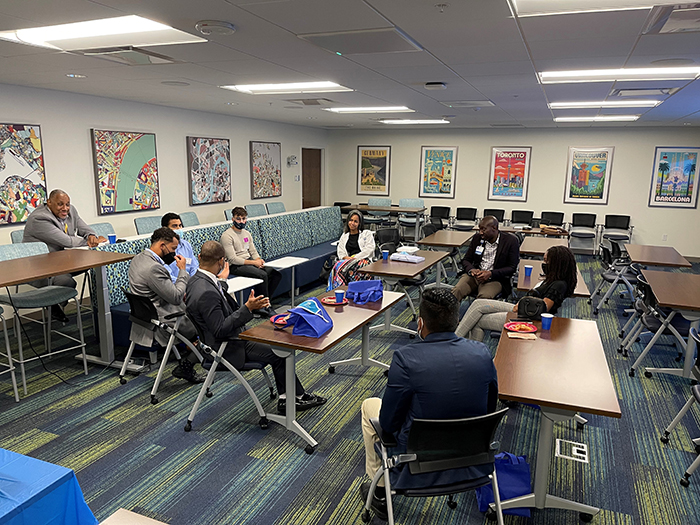
Members of the Brain Expansions Scholastic Training program and Moffitt's Faculty Diversity in Oncology Program discuss strategies for success in medical school during a recent gathering on the Moffitt campus.


